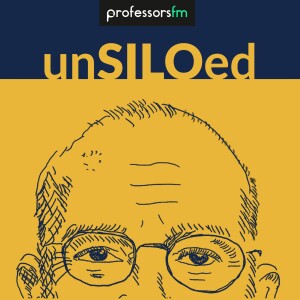
232. Cancer, Cooperation, and Cheating feat. Athena Aktipis
 2023-01-09
2023-01-09
All multicellular organisms face the risk of cancer cells developing and growing. When these cells work together and cooperate they can create new problems that require novel approaches to solve. Healthy cells also cooperate with each other in the effort to eliminate the cancer as the two sides battle for territory in the body.
Athena Aktipis is an Associate Professor of Psychology at Arizona State University, the Director of ASU’s Interdisciplinary Cooperation Initiative, and a member of the Center for Evolution and Medicine. Athena is also the author of The Cheating Cell: How Evolution Helps Us Understand and Treat Cancer. She is a cooperation theorist, theoretical evolutionary biologist, and cancer biologist working at the intersection of these fields, and she searches for general principles of cooperation that manifest across diverse systems.
Athena and Greg discuss the world of cancer cells, and the way in which they cooperate with each other. They go over different theories for cellular evolution that relate to cancer and Athena shares some surprising strategies to deal with cancer when it evolves in a body. They also discuss ways to deal with evolutionary management, and the different approaches that some disciplines have that lend themselves well to interdisciplinary study.
Episode Quotes:How should cancer intervention be approached?
33:24: If we think about cancer as an evolutionary system, as an evolutionary problem, we think of cancer as fundamentally being a process, right? It's a process of evolution happening inside the body in a way that is favoring cells aligned with our interests as beings. Then that allows us to really shift the question about intervention to, how we could, instead of targeting cancer and trying to kill cancer, which, you know, sometimes that makes sense. But we can instead think, "How can we actually shape the process of evolution in the body?"
23:03: One of the dirty tricks cancer cells have up their collective sleeves is that within their genomes are all of the genes that allow cells to cooperate really well to make our bodies functional.
Our bodies are a vast ecosystem for cancer cells
24:00: Our bodies are a vast ecosystem for cancer cells. And there are so many sub-habitats, regions, and places where cancer cells and groups of cancer cells can be early in the evolution of cancer before you can even detect anything like invasion and metastasis. There could very well be these microscopic populations of these groups of cancer cells that are, in all these little niches, that may be competing with each other.
The trade-off with treating cancer
18:49: In order to have a body that would be not susceptible to cancer at all, the ways that evolution could select for that include shutting a lot of things down that are important for other functions.
Show Links:Recommended Resources:- [Andrew Read] How to use antibiotics without driving the evolution of antibiotic resistance
- Faculty Profile at Arizona State University
- Professional Profile on This View of Life
- Athena Aktipis Website
- Athena Aktipis on LinkedIn
- Athena Aktipis on Twitter
- Athena Aktipis on Instagram
- Athena Aktipis on Google Scholar
- Articles on Slate
- Articles Scientific American
- Zombified: Your Source for Fresh Brains Podcast
- The Cheating Cell
More Episodes
Create your
podcast in
minutes
- Full-featured podcast site
- Unlimited storage and bandwidth
- Comprehensive podcast stats
- Distribute to Apple Podcasts, Spotify, and more
- Make money with your podcast
It is Free
- Privacy Policy
- Cookie Policy
- Terms of Use
- Consent Preferences
- Copyright © 2015-2024 Podbean.com






